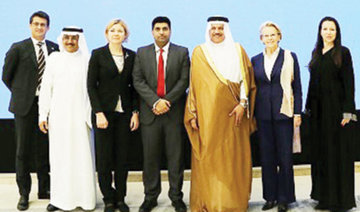RIYADH: The Gulf Cooperation Council and the EU need to work together in an attempt to improve stability in the Arab region, the EU’s ambassador to Saudi Arabia, Bahrain and Oman, Christophe Farnaud said.
Speaking during a roundtable discussion ahead of the inaugural GCC-EU Summit in Brussels on Oct. 16, he cited the conflicts in Palestine, Lebanon, Sudan and Yemen, and Houthi attacks on shipping in the Red Sea, as causes for concern and added: “We have to work together for the stability of the region … we have to work together to promote diplomacy and stability and negotiate solutions to the current crises of the region.
“This will be among the topics that will be broached among the leaders, especially since we are now in a time of very high level of tension and suffering among the people of the region. We all think of Palestine but there is also Lebanon, there is also the risk that we see on the Red Sea (and) in Sudan.
“I’m convinced that on both Lebanon and on Palestine the GCC and EU can find a common language.”
Farnaud said the organizations’ first joint summit will also address a wide range of other topics, including trade, innovation, education and people-to-people relations, in the hope of further strengthening relations and advancing shared interests.
Asked by Arab News how the GCC and EU might work together in an effort to enhance stability and security in the region, the envoy said a “key point” is adoption of “common language.”
He added: “I’m quite optimistic that there will be common talk and common language on Palestine, on Lebanon, on other topics like that, which I think is really needed at the moment. If one state speaks just for itself, it’s interesting but it gives less weight. If all the Europeans and all the GCC countries speak in one voice, it gives more weight to what we have.
“We are at a time when divisions are the worst thing possible, if you want to pass strong messages to the parties, and I think it is necessary now that we have to speak in one voice. If you have all European leaders and all Gulf country leaders speaking in one voice, I think it will make a difference.
“Speaking in one voice and having a clear vision of where we want to go, I think will be very important. What I think is important is that there is an exchange among (the GCC and EU). When you’re at such a high level it’s important that you can exchange and share how you see things and then we will see what kind of common language they have.”
Farnaud said the leaders of member nations of both blocs “will meet, they will talk and they will adopt final conclusions” on topics addressed during the summit.
This year, EU member countries Slovenia, Spain and Ireland officially recognized Palestine as a sovereign state, as did non-member Norway. On the question of whether other EU member states might follow suit, the ambassador said: “On Palestine, the position of the EU, the core position of the EU, is more united than what people think at times,” especially in terms of “working on the long-term political solution, when looking to the Palestinian state, with the two-state solution.”
But he added that it is difficult to say if and when other EU countries will choose to officially recognize Palestine.
“As you know, the principle is accepted by all member states, the only question is the timing,” Farnaud said. “Some have decided to do it already, a significant number, the others want to do it when they consider it to be the most efficient time.”
During the summit, leaders are expected to build upon existing GCC-EU economic, trade and investment cooperation.
“Currently the European Union is the biggest partner of the GCC; in 2023 the trade exchanges reached €170 billion ($186 billion) between GCC and Europe,” Farnaud said.
“They will talk about topics that are key for the future: facing global challenges like climate change, sustainable development, energy transition. All these topics are topics that we have to face together.”
He added that there are a number of fields in which he believes the GCC and EU can work together more effectively, including innovation, education, and health.
The ambassador also discussed the possibility of a Schengen-style arrangement for visa-free travel between GCC and EU countries: “The EU as well as the member states of the GCC share an interest in going further (on the issue). The goal remains, at some point, but it is difficult now to say when. We should keep working on the possibility of a visa-free arrangement between the Schengen area and GCC countries.”
Farnaud highlighted the historical relationship between the GCC and EU, referencing in particular the 1988 agreement that provided the framework for economic and political cooperation between member states of both organizations.
“The relations are not new,” he said. “But since we have shared interests and close relations we have to go further.”
He pointed out that the inaugural summit next week is a result of a GCC-EU ministerial council meeting that took place in Muscat, Oman, on Oct. 10 last year.
“During that meeting … it was after the Hamas attack and the Israel offensive, it was decided that there should be a meeting between the GCC and the EU,” Farnaud said.
During that meeting, he added, discussions also took place on ways to boost cooperation and exchange experience and knowledge in the fields of trade, investment, renewable energy, climate change, cybersecurity and green hydrogen.































